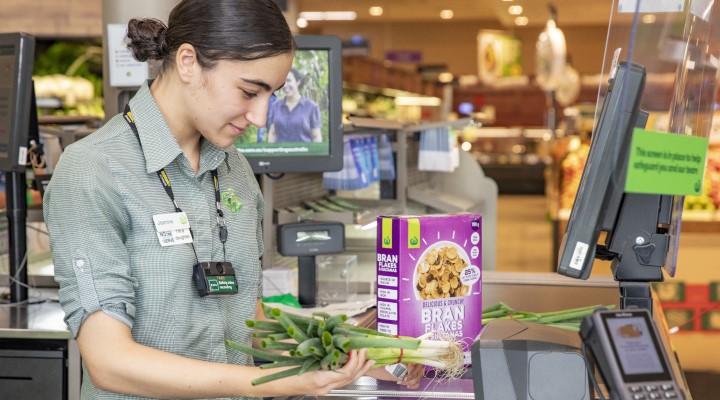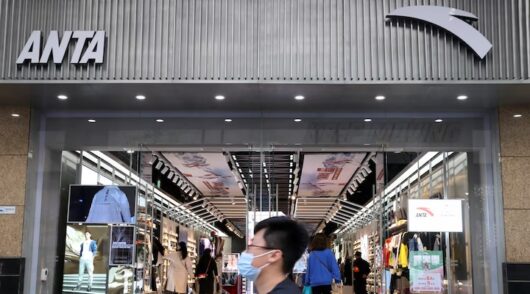Woolworths Group is doubling down on efforts to protect staff from violent and abusive customers by ramping up training and trialling the use of body cameras at select stores. Safety cameras are being introduced at Woolworths Supermarkets as a measure to prevent abuse of team members after assaults at its stores doubled last year. “Nobody deserves to be abused at work, so it’s important we look at new measures to help keep our team members safe,” Woolworths director of stores Rob Mof
ob Moffat said in a statement.
“These cameras are used widely in retail across the US and UK and have been effective in reducing the rate of reported incidents.”
The cameras hang from a strap around the employee’s neck and record customer movements when turned on. They do not record audio and Woolworths said they will only be used “as a last resort” if a supervisor is concerned about a threat to team safety.
The safety measure is being introduced at five Woolworths Supermarkets in Victoria, three in New South Wales and at stores in Western Australia, South Australia and Queensland. All participating stores will add signage to advise customers that these cameras are in use.
Should any footage need to be reviewed, it will be conducted by a small team of Woolworths security experts and law enforcement agencies where appropriate.
Customer abuse on the rise
An increase in customer abuse has plagued retailers since the start of the pandemic. The National Retail Association (NRA) revealed in August that some retailers reported up to a 400 per cent increase in aggression and abuse as a result of Covid-19 restrictions.
The NRA’s Health and Wellbeing of Australian Retail Workers report found that over 85 per cent of retail workers experience verbal or physical abuse while trying to prevent crime and one in three have been physically abused while trying to prevent theft.
Jana Bowden, an expert in consumer psychology and consumer engagement at Macquarie University Business School, said customer aggression towards retail staff was on the rise pre-Covid, but the anxiety brought about by the pandemic has led to a surge in public aggression.
“Retail workers are trained to deliver on the old adage “the customer is always right” but this doesn’t extend to tolerating antisocial and abusive behaviour. We have seen a parallel crime and violence epidemic emerge alongside the pandemic,” Bowden told Inside Retail.
“This has a massive negative impact on the mental, emotional and physical welfare of retail staff. Almost 70 per cent of [retail] staff have experienced a mental health condition during Covid-19 and customer abuse is exacerbating this,” she added in reference to Indicators of a Thriving Workplace Report, Spotlight on the Retail Industry 2020.
And with retail crime costing Australia over $9 billion every year, according to the NRA, it’s not surprising that retailers are investing in equipment and training to protect their staff.
Bowden said the significant changes in customer behaviour have been a catalyst for change in the retail sector.
“We have seen more vigilance around customer and staff safety through increased installation of CCTV security for example, and wearable body cams are another value-add for the retail sector,” Bowden said.
“They provide reassurance to staff that they are safe at work, they support accurate and immediate reporting of abusive events, and they support workers to feel more adequately trained, prepared and equipped to handle issues that may arise. They are also proven to decrease abusive events – increased customer visibility, accountability and transparency reduces confrontation and escalation.”
Bowden also believes it’s not just staff who benefit from increased security measures – customers also feel safer.
“Retailers need to provide support to customers to reduce their risk perception and to support a positive shopping experience.”
Domestic violence awareness
At the Woolworths Group, it’s not just supermarkets that are experiencing the effects of heightened aggression in the community. Employees across Woolworths’ drinks business Endeavour Group are to undergo domestic and family violence awareness following an incident at a BWS store earlier this year, in which a female sought refuge from her male partner, prompting team members to lock the door and call police.
The training is designed to help staff understand what constitutes domestic and family violence; what to do if they see signs of abuse in the community or amongst fellow team members, how to report it; and support systems that are in place.
Endeavour Group’s domestic and family violence awareness training. Image: Supplied.
BWS managing director Scott Davidson said the training will build awareness and support team members to handle situations safely.
“The ripple effect of educating team members who live and work in so many Australian communities can be truly powerful,” Davidson said in a statement.
“We want our team to feel supported and to have the best information readily available to deal with critical issues, so they can remain safe and continue to serve local communities effectively and with empathy.”
Endeavour Group’s 28,000 team members across BWS, Dan Murphy’s and ALH Hotels will be offered the training which has been developed the training in consultation with the national sexual assault, domestic and family violence counselling service 1800RESPECT.
Internally, Endeavour Group staff impacted by domestic violence have access to personal leave, financial assistance and mental health support.
Support systems
The issue of domestic violence is something that the NRA is also working to address. Its Health and Wellbeing report outlines policies to support the 100,000 retail workers that it says are currently experiencing domestic and family violence.
Georgie Chapman, a workplace relations and safety lawyer at HR Legal, told Inside Retail that employees cannot be expected to leave the impacts of family and domestic violence (FDV) “at the door” when they arrive at work.
“FDV can impact on an employee’s self-esteem, confidence, work productivity and performance, safety, and interpersonal relationships within the workplace. It can also lead to the development of mental health conditions,” Chapman said.
“[It] can lead to increased staff turnover, high rates of absenteeism, loss of productivity, emotional impacts on other team members, decreased workplace morale and safety risks.”
She advises businesses to implement a FDV leave policy, appoint FDV contact officers to manage disclosures, offer staff flexible working arrangements and provide employee assistance programs.
While it can be difficult for an employer to address sensitive and personal issues like this, there is a duty of care, she said.“The law requires employers to proactively identify workplace hazards and eliminate risks as far as reasonably practicable. This includes a requirement for employers to monitor the health and safety of employees and take steps as far as reasonably practicable to eliminate or mitigate the risks of FDV and its effects in respect to their employees.”







